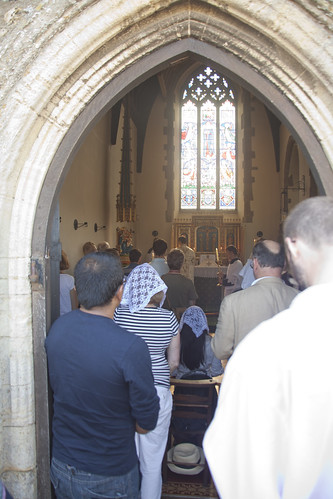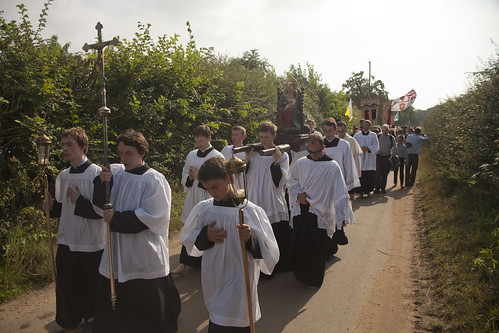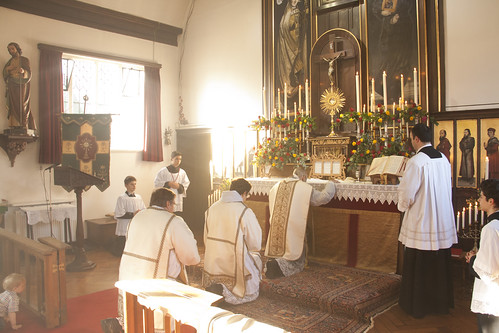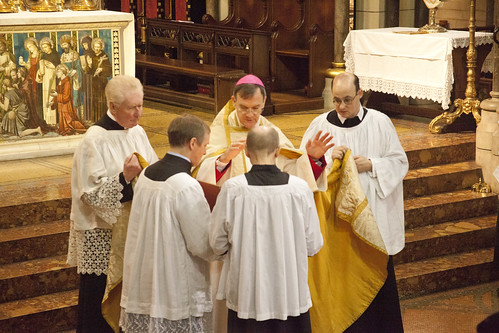 |
| Looking in from the outside, at Walsingham |
An interesting spectacle has arisen on the internet: Michael Voris
has criticised Catholic Answers for the high salaries their big-name people have, and Fr Dwight Longenecker has
defended his friends and criticised Voris. I have in the past criticised
both Voris and
Fr Longenecker, for different reasons, and now I feel both of them has a point.
Voris is railing against 'professional Catholics' being paid six-figure salaries (in dollars, of course). Fr Longenecker says he'd like to see a few more professionals in Catholic apologetics. Touche - I also think Voris is a bit of an amateur. (Full disclosure: I am not a professional theologian, and nor am I paid by the Latin Mass Society. I get expenses, mostly for travel, when I get round to claiming them.) But I think Fr L has missed Voris' point, which Voris doesn't articulate but I think takes for granted. These salaries are connected in Voris' mind with the big salaries of liberal diocesan administrators, as part of a military-industrial complex - well, ideological-liturgical complex - of the Catholic Establishment, which has done nothing over the last two generations but preside over a disastrous decline. Leaving it to amateurs like Voris to say the things which need saying.
No doubt the guys at Catholic Answers see themselves as a beleaguered remnant battling against the odds for the truth. (Funnily enough, Catholic liberals have
the same self-image.) But from Voris' perspective, they are part of the Establishment of mutual back-scratching, and the salaries demonstrate this. The fact is that there is, in the USA at least, a Conservative Catholic establishment, with endowed institutions, a career-structure, access to the hierarchy and so on. And, Voris says, while acknowledging the good they do, they are also part of the problem. Because they refuse to see the real causes of the problems in the Church.
The problem Voris identifies with certain 'conservatives' is that, in order to have a seat at the big table as part of the Catholic Establishment, they profess themselves content with, or even enthusiastic about, the wrenching discontinuities of liturgy and theology which are present in the Church today. This then manifests itself with a contempt towards Traditionalists.
There is an established definition of a Catholic Traditionalist: they are people who wish to live in continuity with their predecessors in the Faith. This means that, while not rejecting organic development or new initiatives, they prefer the Traditional Mass, they gravitate towards traditional spirituality, they regard innovations of institutional form or theology as having to make their case: they must carry the burden of proof. This is, of course, what all Catholics should be like, this is the attitude called for by Popes down the ages, it is even explicitly demanded, in liturgical matters, by the Second Vatican Council.
Sacrosanctum Concilium 22:
Finally, there must be no innovations unless the good of the Church genuinely and certainly requires them; and care must be taken that any new forms adopted should in some way grow organically from forms already existing.
 |
| Not fruitcakes on the march, just Catholics on pilgrimage, doing what we've always done. |
I don't object to the intelligent
labelling of schools of thought, but really, Traditional Catholics are just Catholics. People who think the Church began in 1962 may be baptised and confirmed members of the Church, but their attitude is not a Catholic one.
But this Catholic attitude is a rebuke to some 'conservatives' - maybe they have a guilty conscience. So we have incessant attacks on 'radtrads', as Fr Longenecker delightfully calls them. He doesn't bother telling us who exactly he has in mind, he neither names names nor specifies theological positions, but
when challenged he says that he likes good Traditionalists and is only attacking the bad ones. This is a lazy old trick: who is which? What kinds of 'traditionalist' attitude counts, according to Longenecker, as sede vacantist or anti-semitic?
You can't spend long in the Catholic world attached to the Traditional Mass without being called a sede vacantist or an anti-semite. I have been called both, at least by implication, over the years. I have no way of telling whether my own views don't put me into Fr Longenecker's sights: whether, that is, he is only criticising people who are
genuinly sede vacantist and
genuinely anti-semitic, or whether he is using these terms as hiss-words to apply to a much larger group. Of course, there is a lunatic fringe, there are people attached to the Old Mass who have genuinely unpleasant views, and I've been attacked by them as well. I am a bit hazy about exactly what Christian Order stands for these days, but they think
I am insufficiently hard-core for them and I am pretty content with that situation. But even if Fr Longenecker does have only the nut-jobs in mind, it is hardly helpful to fixate on them.
I don't spend all my time attacking the people who've been excommunicated for carrying out bogus ordinations of women: the radical liberals. Why not? Because they aren't a serious part of the conversation. Not even the
Tablet takes them seriously. Sure, if they got too much influence they could drag the whole progressive Catholic groove into disrepute - to parallel Fr Longenecker's argument about trads - but that isn't going to happen, they know perfectly well what lines they can't cross. Fr Longecker should apply his critical faculties to the positions which are part of the conversation: the views of ordinary Traditionalists, their respected publications, organisations, conferences and so on. There's plenty there to get your teeth into.







